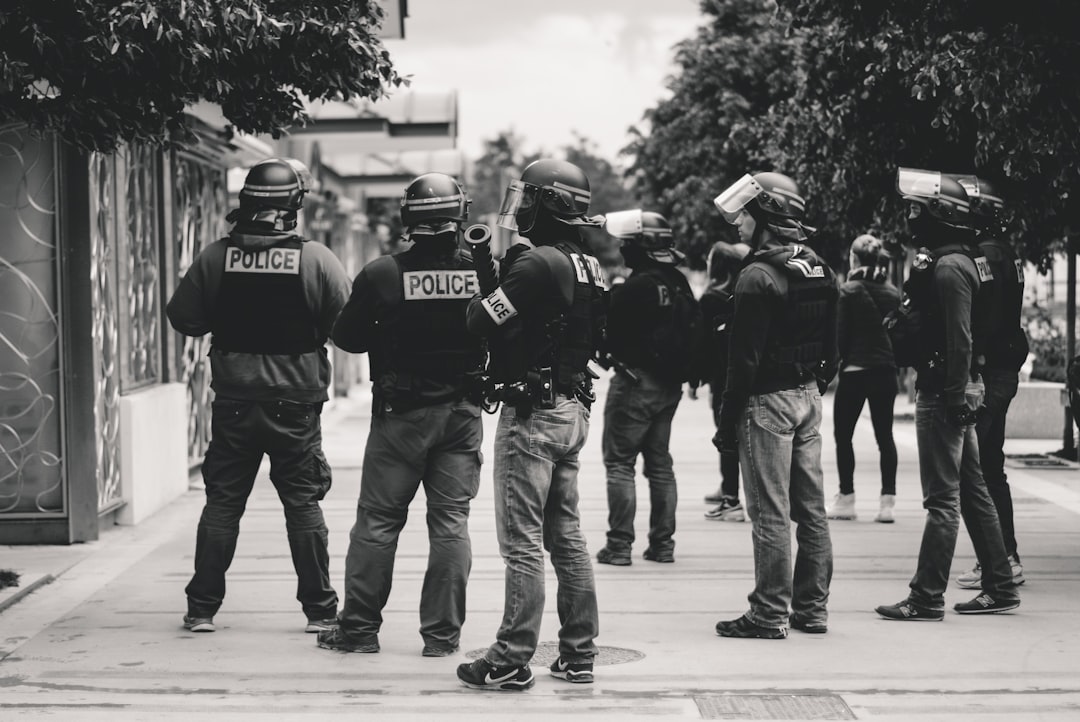A bailiff is a person who has the responsibility of enforcing court orders. In most cases, they work with law enforcement to make sure that people follow the order.
They usually have some type of security training and may occasionally carry firearms or handcuffs.
There are many different types of bailiffs including criminal, family, traffic, and juvenile. Becoming a bailiff can be an exciting career option for those who want to help protect our justice system.
Table of Contents
ToggleBailiff Job Description
A bailiff is a public servant who enforces court orders. They are generally found in the court system overseeing what occurs during hearings and trials, from making sure everyone is where they should be to keeping order among the participants.
In addition, bailiffs also process payments, maintain court records and perform many clerical duties. Some bailiffs also serve as security guards, which means they are responsible for warding off threats to the court.
Since their duties may require them to assist judges and other officers of the court, bailiff jobs usually require applicants to have a minimum level of education or training.
What Does a Bailiff Do?
The bailiff is a protective officer of the court and works in tandem with jurors, judges, defendants, and members of the public.
They are employed at different levels of government, usually by local courts as well as on state and federal ones. Their duties include:
1) supporting the judge
2) maintaining order in court
3) Being present outside court during proceedings to maintain security bailing people out or enforcing remand orders if required;
3) executing return warrants for those who have not complied with an earlier ruling of a court;
4) performing administrative tasks such as related to serving notices or preparing documents submitted in evidence
5)ensuring the courtroom is safe, declaring the entrance for judges and making sure rules are followed.
6) Ensuring people who enter are not armed with guns or other weapons and confiscating all unauthorized weapons from them
7) aiding witnesses by bringing them to testify
8) escorting prisoners to and from courts
9) transporting evidence presented in court.
10) When a jury is sequestered in a hotel, the bailiff is responsible for security. They accompany the jurors to restaurants or other areas, ensuring the jurors do not contact other people.
Steps to take in order to Become a Bailiff
Like most jobs, the process of becoming a bailiff varies depending on what level of government you want to work for and what state or county that seat is located in. So research would be necessary to determine what is required.
STEP 1 – Meet the requirements and qualifications
Qualifications for bailiffs can vary, but generally, they should at a minimum:
- You should have a high school diploma or equivalent
- Must be at least 21 years old (18 for certain jobs)
- Pass a criminal background check, drug screenings and physical endurance test
- Effective bailiffs have a good understanding of criminal justice systems and law enforcement.
STEP 2 – Pursue specialized training.
You may also benefit from a degree or certificate in criminal justice. For example, with a Bachelor’s Degree in Criminal Justice you’ll be seen as more qualified and able to work at a higher level.
Some bailiffs are expected to have law enforcement training and graduate from the police academy. In addition, they may need the following skills:
- Learning how to shoot guns.
- Non-lethal defense training. You can use pepper sprays or police batons.
- Self-defense techniques
- Threat neutralization training is a technique in which one deliberately adopts the mindset of an aggressor.
- First Aid Training and CPR Courses
- A bailiff needs to have strong communication skills in order ensure that the court process runs smoothly.
- Your observation skills should be excellent.
- The behavioral sciences may help assess and make predictions about potential threats
STEP 3: Pursue The Required Experience
Some bailiff openings require you to have field officer experience and others may want an applicant with courtroom administration experience. Pursue entry level positions that satisfy these requirements. Apply for positions as a trainee bailiff if necessary for your eligibility qualifications.
Even if experience in your field is not a requirement, you may be at an advantage for the job opening by pursuing entry-level positions that will make you more competitive for the position.
STEP 4: Start Working as a Court Bailiff
Meeting the minimum eligibility requirements for a bailiff position can lead to securing a full-time position with enough effort. Some people may be satisfied with this career path, but it’s worth noting that there are similar positions available in higher courts throughout the country.
Positions as bailiffs are rare and hard to come by, but if you’re looking for another job related to the criminal justice industry, there are other careers available. One of these is the position of court bailiff. Court bailiffs provide a very valuable service that can greatly benefit their employers in the criminal justice system.
Education Requirements
Being a bailiff takes no specific degree; however, many people who become bailiffs are former military police officers or have some law enforcement experience because training tends to be similar between the two professions.
This means that military personnel and police are often eligible for the job. In some cases their previous experience in the military or as law enforcement officers will count as credit for training.
Take a look at the education and experience required to succeed as a bailiff:
School: A bailiff’s qualifications may include a high school diploma, vocational training, or some college courses.
Courses: Bailiff work doesn’t require a specific type of education, but for those who are earning a criminal justice or law degree, it can give you an edge.
Training: People who want to be bailiffs must complete a training program, which can last anywhere from several months depending on the state.International Association of Directors of Law Enforcement Standards and Training maintains links to states’ Peace Officer Standards and Training programs. Academy trainees receive instruction in a number of subjects, including self-defense, institutional policies, regulations, operations, and security procedures. Bailiffs may also be required to complete CPR and first aid training.
Experience: In most cases, bailiffs with experience in the law enforcement or court system will be preferred. While some courts may be open to candidates who are younger than 21 years of age, you should always have your driver’s license and a clean background investigation before applying for the position.
Job Outlook
The job outlook for bailiffs depends on what branch of government you intend to work for. Bailiffs working for state courts usually have little change in employment numbers while those who work with the federal courts may see a rise because there are many new agencies being created at that level of government.
The average number of bailiff positions is five each year across all levels, so competition is stiffer than it would be in another line of work and salaries aren’t what they could be.
Salary
The Bureau of Labor Statistics found that bailiffs in the United States earn a mean wage of $45,760, with years of experience and other factors determining salary. Bailiffs also receive benefits at this average annual wage. Although jobs are projected to decline 7% from 2016-2026, most openings will be due to retirement or as current bailiffs relocate to other careers.
This means that more training is needed so that people can be prepared when these openings become available. You must also show initiative and a willingness to do what it takes to get the job done because bailiffs with experience often have the first choice among the positions.
Salary Details
PayScale reports that bailiffs earn $22,000 to $115,000 per year. The average bailiff salary is $49,560. Compensation for bailiffs is usually based on what they do for a living and what part of the country in which they work.
According to Salary.com, federal bailiffs make an average annual wage of $54,430 or about $26 per hour. Those who work in the court system of Florida earn an average annual salary of $37,400 or about $18 per hour. The median national salary for bailiffs as of 2012 was $43,000.
Bailiff Salaries by State
The Bureau of Labor Statistics reports that bailiffs working in state government report an average annual salary of $40,960. This is what they found:
Alabama $30,590
Arkansas $33,260
Arizona $32,920
California $63,620
Colorado $62,640
Delaware $31,260
Florida $46,160
Georgia $46,470
Hawaii $46,730
Idaho $36,510
Illinois $65,510
Indiana $36,860
Kansas $40,170
Kentucky $25,170
Louisiana $39,030
Maryland $39,160
Maine $36,450
Michigan $43,600
Minnesota $45,170
Missouri $34,260
Mississippi $30,420
North Carolina $34,230
North Dakota $28,130
Nebraska $57,920
New Hampshire $30,160
New Jersey $49,310
Nevada $57,830
New York $69,890
Ohio $45,700
Oklahoma $31,050
Oregon $49,680
Pennsylvania $32,650
Puerto Rico $31,500
South Carolina $24,660
Tennessee $34,290
Texas $51,210
Utah $49,410
Virginia $41,110
Vermont $40,820
Washington $58,400
Wisconsin $27,700
West Virginia $28,530
Employer Benefits & More Information
Bailiffs that are employed by state and federal government agencies do not usually receive any benefits. According to the Bureau of Labor Statistics, bailiffs in local governments may receive paid vacation days and some health coverage. Depending on what you want out of your career as a bailiff, what benefits you receive will be what determine what branch of government you work for.
Frequently Asked Questions
Is bailiff a good job?
Bailiffs jobs are good for those who have little or no criminal justice background. The training program is rigorous and bailiffs must know a lot to do their job effectively. You should also have some work experience in the government, military, or law enforcement before applying because you will be required to make legal decisions at times.
How Much does a bailiff make per hour?
The Bureau of Labor Statistics found that the median hourly wage was $15.38+, or $32,190 annually. This average includes people who work part-time and for themselves, so salaries will likely be higher for bailiffs who work full-time in larger jurisdictions.
how much does a bailiff make per year?
The average annual salary for bailiffs is between $45,760-$100,000 per year. This number varies depending on the state, city and jurisdiction you are employed by, so be sure to inquire about this when applying for jobs.
how much does a bailiff make per week?
Bailiffs earn between $500 – $1500 a week depending on what branch you work for, and whether you are full or part-time. You will probably make much more if you work for a federal agency.
How much are bailiffs paid?
Bailiffs receive benefits such as health coverage, including vision and dental insurance. Depending on the branch of government you work for, bailiffs can earn from $40,000 to $100,000 per year.
How do I become a bailiff?
To become a bailiff is difficult, but it is not impossible. There are several steps that you must complete before being offered a position. The first step is to be familiar with the duties of bailiffs and then apply for an internship. After your internship, another step would be to take the bailiff exam by showing proof of education and experience in criminal justice related fields. Another way to become a bailiff is to have already worked as a law enforcement or corrections officer.
This last way is probably the easiest of all, but you must still know the duties and responsibilities of bailiffs before applying for a position. If you are already employed in another criminal justice related occupation, it will be easier to apply because you have most likely already received training on what is needed to become a bailiff.
The process of becoming a bailiff is lengthy, but this career path is a rewarding one. Not only do you protect the public and enforce the law, but you get to keep society safe and become a part of history.
Which state has more bailiffs?
New York has more total workers in the field than any other state, but Texas has more bailiffs than any other. There are about 8,980 bailiffs working in New York while there are just over 10,000 workers doing the same job in Texas.
After those two states, California is third with 6,690 workers and Illinois comes in fourth place with 4,740 people holding this position.
Who is the highest paid bailiff?
The highest earning bailiff in state government is the Illinois Department of Corrections. According to Payscale, that person earns $134,000 per year. The Los Angeles County Sheriff’s Office pays the most with a salary of $152,566.
Are bailiffs cops?
Yes, bailiffs are law enforcement officers. They enforce the rules and laws of a court as well as keep society safe.
What is the job of a bailiff?
Bailiffs work in the courts to ensure that trials go smoothly by making sure jurors and witnesses are present while keeping order in the courtroom.
What does a bailiff say in court?
A bailiff is responsible for many things in the courtroom, but they are most often asked to announce to the court who has arrived. Bailiffs also escort witnesses and jurors to and from the courtroom as well as protect them. They also make sure that prisoners stay calm while attending their court hearings.
What’s the difference between a bailiff and a sheriff?
Each state has different rules, but in general bailiffs and sheriffs enforce the law. Sheriffs typically wear badges while bailiffs do not. The main difference between these two is that sheriffs are responsible for keeping order in counties, whereas bailiffs work only within the courts or prisons they serve.
Do bailiffs use guns?
Although some jurisdictions allow the carrying of firearms, in most cases they do not. Many jurisdictions prohibit bailiffs from carrying weapons with exceptions for small knives, batons or other “non-lethal” means of self-defense such as pepper spray or an electroshock weapon (Taser).
Does a bailiff make all the decisions?
It is up to the judge where a matter will be heard and which type of magistrate will hear it. Therefore another person, not a bailiff will decide the issue. However in many cases, bailiffs are responsible to collect and enforce judgment as well as serving court documents and they also can make some decisions if permitted by law.
What do bailiffs do?
Choose a career as a bailiff is choosing to deal with many different types of people in situations where there can be conflict. Bailiffs are number one priority for keeping the peace and they sometimes have to take control of an entire room in order to accomplish this goal.
The basic job duty of a bailiff is to ensure public safety while court is in session or while other government business takes place. This involves ensuring that all persons involved remain respectful, abide by the rules and keep quiet during proceedings until it’s time to speak. They also escort prisoners when needed, arrest those who violate the law and guard property so that it doesn’t disappear. Most of these duties require some level of authority from the court or from the individual in charge so bailiffs also perform duties that are delegated to them.
What kind of training or education is involved?
Most bailiffs attend a state certified bailiff academy where they receive multiple hours of instruction on how to safely detain and arrest individuals as well as many other facets of their job. Since each state has different requirements, it’s important to learn about these laws before entering into this profession.
What are the pros & cons of becoming a bailiff?
Pros: Regardless if you work for the federal government or in county court system, your career choices are wide open. You can live anywhere in the country and there will always be jobs available because every single court system needs at least one bailiff on duty. The amount of job security that comes with this career choice cannot be ignored.
The pay is relatively good and benefits are available in some cases.
Cons: The drawback to this career is that the hours can be long at times and the work environment can sometimes be overly chaotic. This job requires concentration skills so you must be able to focus on multiple things at once. Being a bailiff isn’t for everyone because of these reasons, but if you have what it takes, then being a bailiff could make an excellent career choice for you.
What are my chances of getting hired?
Because of the ongoing need for bailiffs in all levels of government, employment opportunities remain favorable for people who want to become a bailiff or already have experience working as one by going to school locally and receiving state certification graduating at the top of their class. Employment will most likely be in demand for bailiffs because of a steady flow of new jobs created by retirements and natural attrition, as well as increased need to ensure courtrooms remain safe and secure during sessions.
Most people who want to work as an officer would like to first experience it on a volunteer basis. This helps them determine if they really like this kind of job or not before going into employment full time.
What is the salary range?
Salary varies depending on what state you are working with but can start from about $40,000 per year up to $100,000 per year depending on location and years of experience under your belt. Some states offer benefits such as vacation days, sick days, and health insurance for those who meet the requirements of this type of employment.
Bailiffs are highly trained and must remain on their toes at all times. This is a demanding job that requires compassion, understanding and patience in order to be successful while working with members of the public when they are most stressed out during court proceedings.
While many people want to become bailiffs, not everyone has what it takes to work in this career field so make sure you have what it takes before going into training for certification or starting any other aspect of your new career.
You won’t regret choosing a career as a bailiff if you enjoy helping others and keeping them safe because that’s the main goal in becoming one: keeping everyone safe






